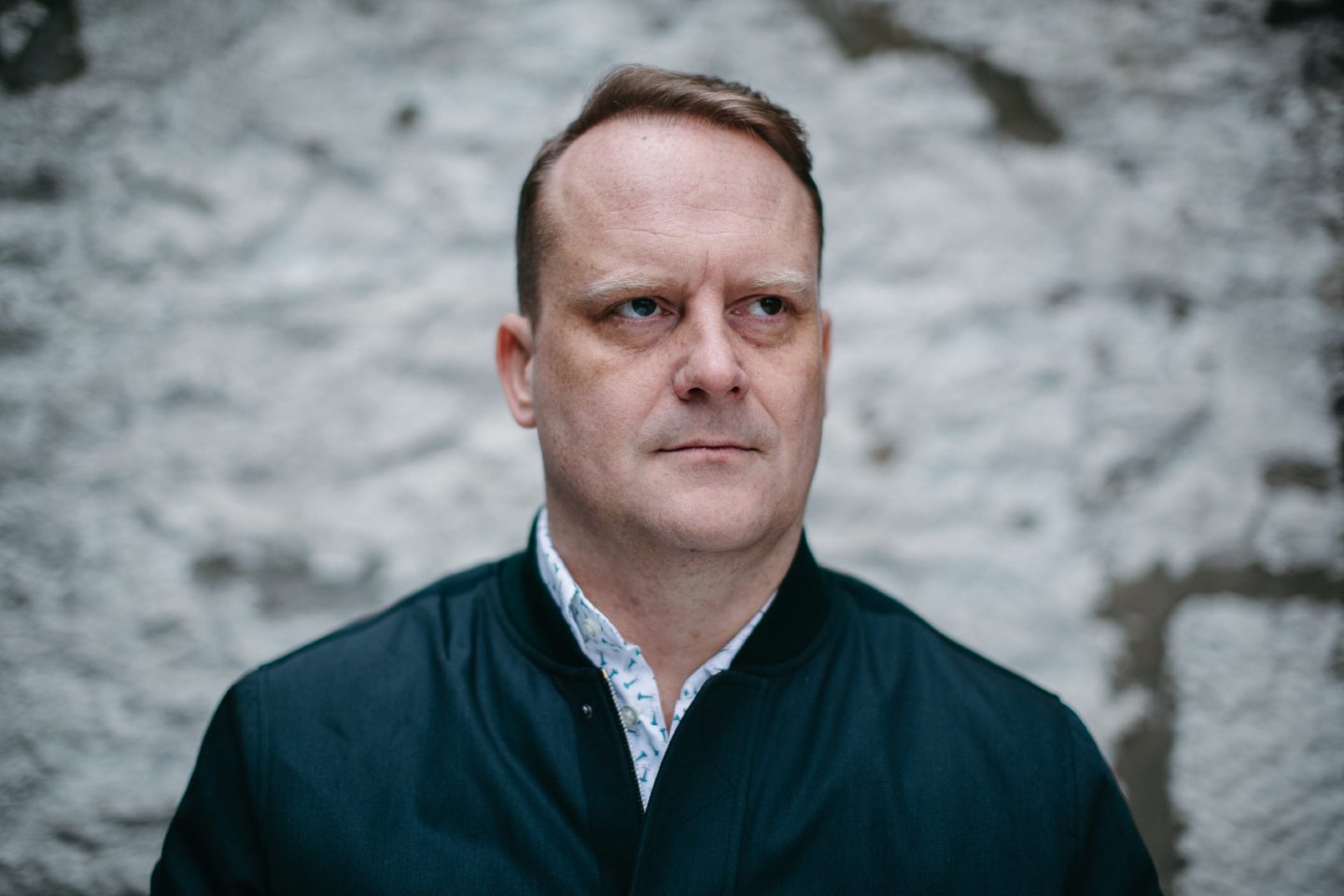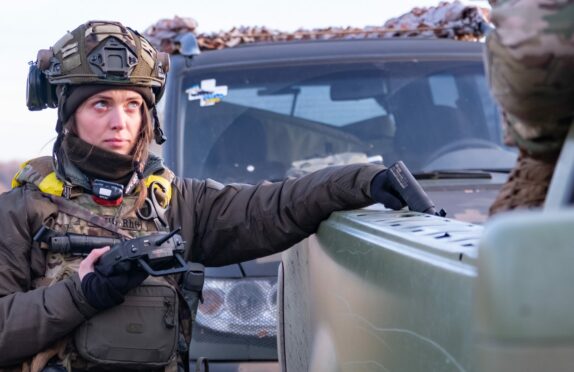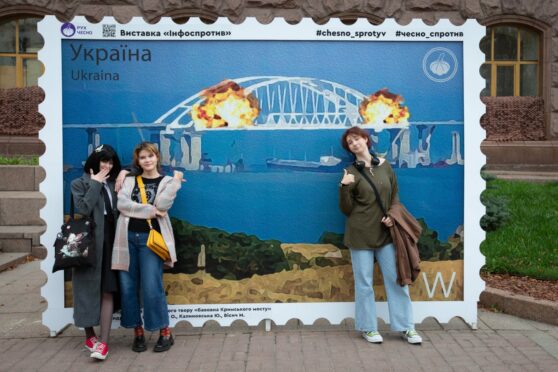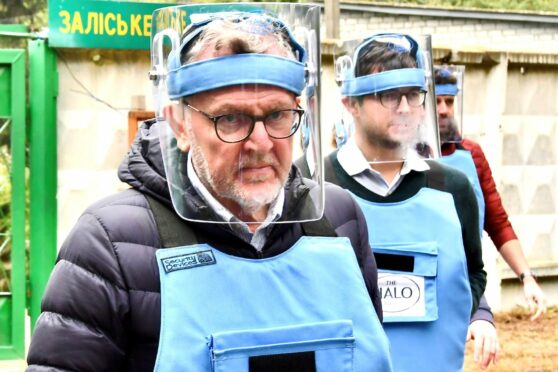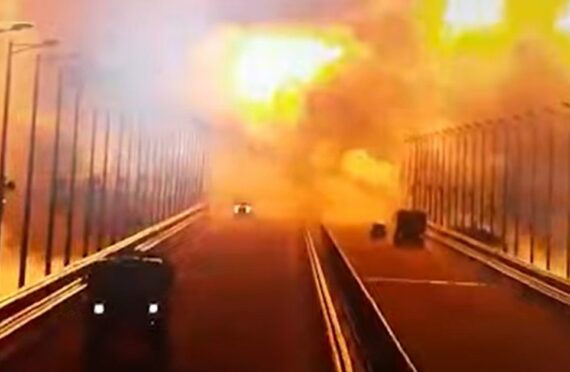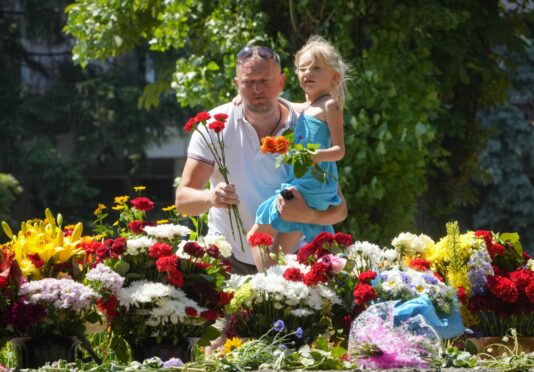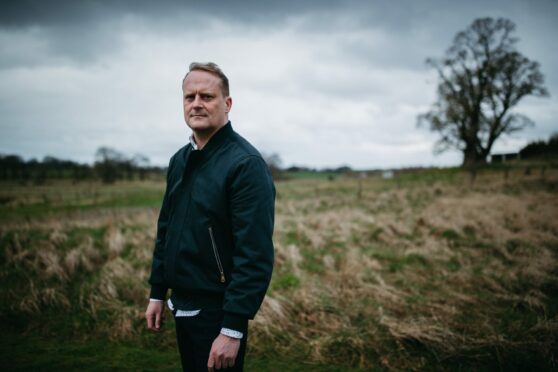
One of the BBC’s most experienced and respected war reporters describes his weeks on Ukrainian frontline after returning to Scotland to spend some time with family.
Svitlana paused at her front door as the Russian shells continued to land around her apartment block. The 72-year-old lived on the edge of Kharkiv, Ukraine’s second largest city, with her husband Sasha. It had been their home for more than 20 years.
“I can’t even understand what I feel right now because of the anxiety…it’s very disturbing,” she said. They were being driven out of their flat by Russian bombs.
Svitlana had her silver hair neatly held back. When I asked her a question she’d cast her eyes down and left, before giving a thoughtful answer. She wore silver fur-lined boots – “I’ve had them for two years” – and sat with her feet neatly together, her hands on her knees, a hint that she’d once been an instructor in a military college. Two of her daughters were serving in the military, on her phone she showed me a video of one marching in uniform. Sasha has become used to following instructions in the household. “Did you know that there were a tribe of Ukrainian amazons where I grew up?” Svitlana asked me.
Since the invasion of Ukraine on February 24, their cosy two-bedroom apartment, crowded with house plants and dressers full of Svitlana’s grandmother’s fine china, had been on the frontline. Most of the back windows were gone, they’d been sleeping for only two hours a night, in the central sitting room. She and Sasha hadn’t had heat and power for days. It was -5 degrees outside.
The roar of Russian artillery was constant. Many of the apartment blocks in the Saltivka neighbourhood had been hit. One entire 20-storey block had been destroyed. A nearby tower block had a 500kg Russian bomb land, and fail to detonate, on its roof. Their little black Honda car, sat in the parking lot downstairs, had taken a direct hit. Outside their windows, trenches and tank traps – great steel hedgehogs – had been placed on the street to stop any Russian advance. Ukrainian soldiers moved quickly across the street, dodging incoming fire and casting wary glances upwards for Russian drones.
But at that very moment in the doorway, Svitlana had other concerns. If she was leaving, possibly never to return, was there anything she’d forgotten? She turned around and went back inside the flat, returning moments later, wearing a full mink coat. A long, cold journey lay ahead.
I’d arrived in Ukraine a week after the invasion began and, along with cameraman Darren Conway, had driven for three days to get to Kharkiv, near the country’s eastern border with Russia.
If you don't recognise these tactics, then you haven't been paying attention. From Kharkiv's frontline, #Ukraine @dcinfocus and Feras. With thanks to our local team. @BBCNews @BBCWorld Graphic content warning. pic.twitter.com/hhGK1tudpp
— Quentin Sommerville (@sommervilletv) March 10, 2022
Vladimir Putin had launched his biggest military action to date, attacking neighbouring Ukraine in the north, east and south. He claimed the aim was to liberate the country, “de-Nazify” and “de-militarise” the territory which had once been a part of the Soviet Union.
In Russian, the country’s name means “borderland”. Putin, once a low-ranking KGB agent, had spent his honeymoon in 1983 Ukraine, visiting Kyiv, or Kiev as it was then. As far as the Kremlin was concerned Ukraine wasn’t a sovereign country, it was Russian.
Moscow’s expectation was that Russian-speaking cities like Kharkiv would welcome the invading forces. An intelligence officer in the city told me that when they captured early Russian attackers they found police batons, rubber bullets and tear gas in their vehicles. The Russian forces weren’t expecting serious resistance, just the occasional protest. “We surprised them,” said the officer.
In fact, Ukraine surprised the world. It put up a fight and the expected early Russian victory never came. A month-and-a-half later, the Kremlin’s ambitions have, for now at least, seemingly diminished. Its forces appear to have abandoned plans to take the country’s capital, focusing on fighting in the east. Kharkiv, which had a population of nearly 1.5m people before the war and lies just 19 miles from the Russian border, is still under threat and is being shelled daily, but still it resists.
When we arrived in Kharkiv I described the huge city as abandoned. However, I was wrong. While hundreds of thousands of people had fled (we passed long lines of traffic heading west on our drive there), many had remained, the city was still alive and resisting. Every morning after curfew lifted I walked through neighbourhoods, passing people out sweeping up glass from broken windows from the previous night’s bombardments and repairing their homes.
In the city’s deep Metro stations, families and their pets had been living for weeks. Children’s drawings of Ukrainian flags and soldiers hung on platform walls, near mattresses and tents and piles of blankets and people’s belongings.
Above ground, streets that were unpassable after a Russian cruise missile collapsed a building would be cleared of rubble days later. Fire crews, hospitals and the rubbish collectors still went about their business, even as the booms from Russian artillery punctuated their days, a foreboding, ever-present drumbeat heard across the city.
But at the frontline, not far from Svitlana and Sasha’s home, you didn’t just hear the drumbeat, you felt it in your chest. In a few short weeks, an ordinary landscape of weekend homes and farms had turned to ruin.
There were trenches and foxholes by the roadside and corpses and burned-out tanks strewn across churned-up fields of mud. It could easily have been a scene from Europe’s past.
In years of covering wars for the BBC, in Afghanistan, Syria, Iraq and Libya, it has always struck me how quickly ordinary life is brought to an abrupt halt by war. Everything is transformed almost in an instant and very soon it’s hard to remember what came before.
And so it was on the edge of Kharkiv. The Ukrainian army had dug in, and repelled Russian infantry again and again. “They are chickens, they only shell us now,” one soldier told me.
But the shelling was terrifying, landing metres from the soldiers we were following. On one occasion a Russian wire-guided missile flew just above our heads, its thin copper guidance wire landing at my feet.
But for the Ukrainian men at the front, this had become normal. Wars are full of surreal moments. After the missile flew overhead we were sheltering in a five-metre-deep bomb crater when a young Ukrainian soldier, Roman, jumped in beside us. “Hello, good friends,” he said with a smile. “Selfie?” We grinned as he took a picture with his phone.
The same bomb crater had taken the lives of six Ukrainians in a single strike in the first vicious days of the battle of Kharkiv. And the same soldier, Roman, had loaded up the yellow van he’d bought a month before the war with the bodies of his comrades and took them to the city mortuary. Further back from the front, we again had to take cover as another Russian barrage landed. In a small underground shelter I met a colonel in the Ukrainian army, Vitaly, 49. Until a few months ago he was a PE teacher but since the start of the Russian invasion, he’d been fighting.
“For the whole night they’ve been shelling, he said. “Like every 30 minutes there’s shelling, all night and the whole day, too. And the heavy artillery is like 20, 25 kilometres away from us, but they can fire up to 60 kilometres.”
The whole city is within reach of Russian guns. Enduring it is a shattering experience. Back in the Saltivka neighbourhood, Svitlana and Sasha closed their front door and walked down five flights of stairs. The lift stopped working weeks ago when one of the flats in the building took a direct hit from a Russian rocket. Their last remaining food they gave to some neighbours, but most of the apartments they passed in the darkened stairwell were now empty.
Their own car destroyed, they climbed into a military vehicle, which took them to safety. Still their city was being shelled, but they were out of immediate danger. It was the first time they’d left the apartment together since the invasion, and it was overwhelming. “Look at my hands”, said Sasha. “They were fine when we were at home, but now they are shaking.” His fingers were covered in soot. When the power had failed the week before, he’d built a small fire in the stairwell to warm soups and canned stews. Now they were both exhausted.
The next day they took a train west, and from Ukraine they went to stay with friends in a nearby country. They call my Ukrainian colleague often to check in, and to see how we are doing. Every day they ask: “Has the shelling stopped in Kharkiv?”
But that day they left their apartment is one I won’t forget, not just because of the shelling or the gun fire but because it was my birthday. Kharkiv was a city of shortages and long queues outside supermarkets but somehow my colleagues had sourced a birthday cake, which we shared with the couple.
“I have a gift for you”, said Svitlana. It was a silver cross. From her handbag she produced some twine and tied it around my neck. “It will keep you safe,” she said with a smile.
After a month in Ukraine, it was time for me to head home too. I live in Beirut, Lebanon, but instead headed back to Scotland to see my family and share yet more birthday cake.
Arriving at Glasgow Airport, the traffic, the face masks and the crowds all made the war feel very far away. It struck me then that two months ago, Svitlana and Sasha felt the same way too.
But by the end of my time in Ukraine, people had switched from saying “when the war ends” and instead said “when our victory comes”. Their confidence is growing but they worry the West will forget them and their fight against Russian aggression.
The car home stopped in the rush hour traffic and I looked out at the streets I knew well. And then across a school playground I saw something new, the colours of the Ukrainian flag painted in the window, lighting up a dour Glasgow afternoon.
Quentin Sommerville is the BBC’s Middle East correspondent

Enjoy the convenience of having The Sunday Post delivered as a digital ePaper straight to your smartphone, tablet or computer.
Subscribe for only £5.49 a month and enjoy all the benefits of the printed paper as a digital replica.
Subscribe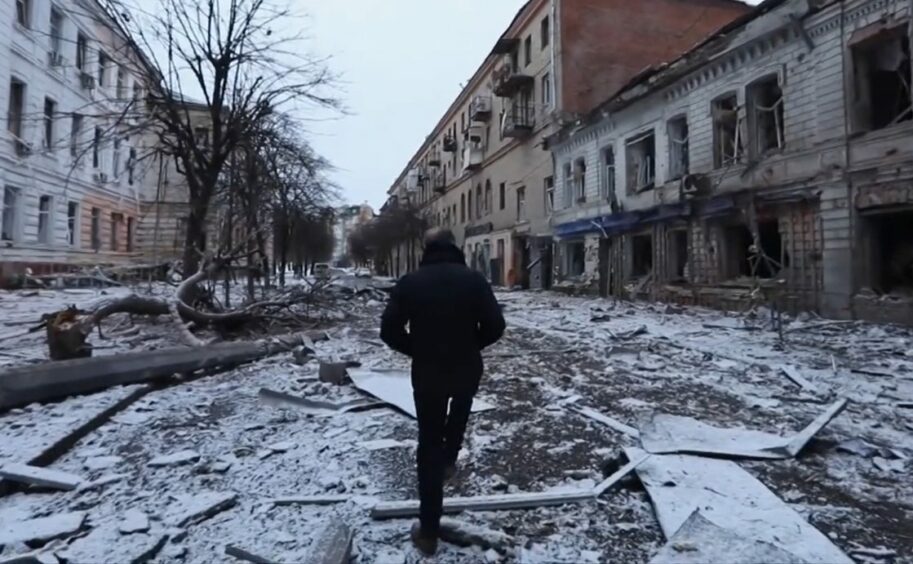
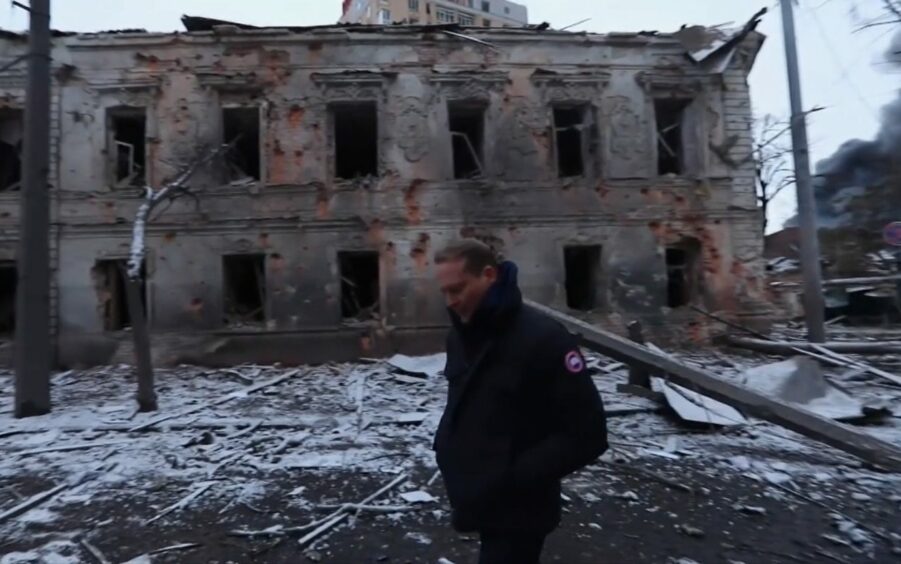 © SYSTEM
© SYSTEM